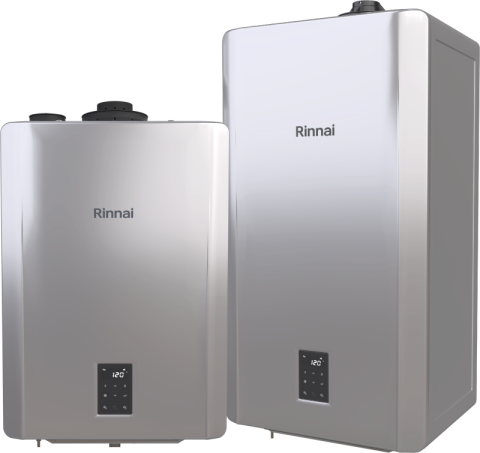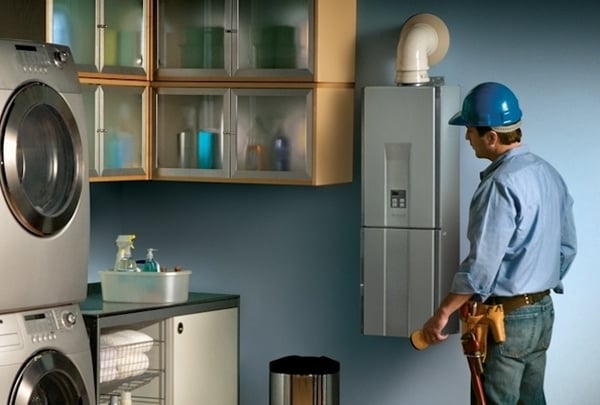Discovering The Benefits Of Tankless Water Heaters
Discovering The Benefits Of Tankless Water Heaters
Blog Article
Everyone has their own theory with regards to 5 Benefits of Tankless Water Heaters.

In a world where convenience and efficiency reign supreme, it's not a surprise that property owners are continuously in search of smarter means to manage their home's energy intake and comfort. One innovation that has actually progressively gained popularity is the tankless hot water heater. However exactly what makes these systems stand out from the standard tank-based designs a lot of us matured with? Allow's dive in and discover the advantages of tankless hot water heater, aiding you determine if it's time to make the switch in your home.
Intro
Picture this: you enter the shower after a lengthy day, anticipating a soothing waterfall of warm water, just to be welcomed by icy beads since the last person used all of it up. Noise familiar? Standard water heaters store a set quantity of warm water, suggesting you go to the mercy of that tank's supply. Tankless systems, on the other hand, warm water on demand. No more going out mid-shower, no more wrestling with schedules just to guarantee warm water is available.
Comprehending Tankless Hot Water Heater
What Are Tankless Hot Water Heater?
Tankless hot water heater, sometimes referred to as on-demand or instant water heaters, give hot water just as it's required. Instead of keeping gallons of pre-heated water, these systems kick into activity the moment you turn on the tap. Water travels through a heat exchanger, warming up in real-time, suggesting you obtain an undisturbed circulation of warm water without the requirement for a huge storage tank resting lazily by.
Exactly how Do They Vary from Typical Systems?
Conventional heating units hold a reservoir of hot water, using power to keep that storage tank at a regular temperature. Tankless units get rid of the standing supply, reducing thrown away energy and the bulky footprint of a large cyndrical tube. Basically, you're updating from a "accumulation" attitude to a "made-to-order" technique.
Usual Types of Tankless Units
Tankless hot water heater usually can be found in two selections: gas and electrical. Gas models often tend to supply higher flow prices, suitable for bigger houses, while electric designs often offer smaller homes and are typically much easier to install. In addition, some systems are developed for point-of-use (serving one fixture) while others can handle the entire home's warm water needs.
Trick Benefits of Tankless Hot Water Heater
Power Efficiency and Cost Financial Savings
No more heating up a giant storage tank's worth of water and keeping it cozy all day. Tankless heaters lower standby energy losses, which can decrease utility bills. While the first cost might be greater, the lasting savings commonly warrant the financial investment.
3. Space-Saving Style
If your home is short on storage space, removing the large container frees up important room. Tankless units are small and can often be mounted on walls, hidden in corners, or mounted in tight utility closets without grabbing all of the entire room.
4. Longer Life-span
A well-kept tankless water heater can outlive its tank-based relative. Traditional storage tanks may last 10-15 years, while tankless designs can keep chugging along for 20 years or even more, making them a strong investment gradually.
1. Countless Hot Water Supply
Ever before had to arrange showers so every person obtains their reasonable share of hot water? With tankless, that becomes a distant memory. As long as the heater's flow capability isn't gone beyond, you can take back-to-back showers without developing into a popsicle.
5. Improved Water Quality
Keeping water in a container can in some cases lead to sediment buildup or a slightly "off" preference. With tankless systems, fresh water is warmed on the spot, lowering the chances of sediment build-up and possibly supplying cleaner-tasting water.
Considerations Before Changing
Though the benefits are compelling, it's important to take into consideration a couple of aspects prior to completely committing.
Evaluating Your Home's Water Use Patterns
If your family concurrently utilizes several fixtures with high hot water need, see to it the device's flow price fulfills your needs. Knowing your use patterns aids you pick the best dimension and kind of tankless heating system.
Upkeep and Treatment Tips
Tankless systems are relatively reduced upkeep, yet they aren't set-it-and-forget-it home appliances.
Normal Cleansing and Descaling
Hard water minerals can build up in the warmth exchanger, affecting effectiveness. Regular descaling (typically suggested yearly) keeps the system running at peak performance.
Annual Specialist Evaluations
A yearly checkup from an expert makes certain minor concerns are caught early. They'll evaluate the device's efficiency, seek leakages, and aid maintain optimal efficiency.
First Financial Investment Expenses
Tankless heaters commonly feature a greater upfront cost. Between the unit itself and prospective setup alterations, the first price might give you sticker label shock. But remember to view it as a long-lasting investment.
Installment Requirements
Relying on your home's framework, you might require extra electric capability or gas line upgrades. Ensure you understand the installment demands and seek advice from a professional to prevent shocks.
Making Sure Correct Air Flow
For gas versions, correct ventilation is important to securely remove exhaust gases. Make sure airing vent systems are tidy and correctly mounted to stop any possible security hazards.
Contrasting Different Brands and Versions
Not all tankless water heaters are created equivalent.
Investigating Reliable Makers
Seek credible brands with a background of producing high quality devices. A dependable producer frequently supplies better client assistance and longer service warranties.
Installation: Do It Yourself or Specialist?
While some property owners enjoy tackling tasks themselves, tankless setup may not be the most effective time to burst out the toolbox.
Benefits and drawbacks of Do It Yourself Installation
A do it yourself mount can save cash, but it comes with threats. Inaccurate installment can cause ineffectiveness or safety worries. If you come in handy and have experience, it might be possible-- however wage care.
Reviewing Reviews and Individual Comments
Customer evaluations and comments from next-door neighbors or close friends that have gone tankless can offer valuable insights. In some cases, real-life experiences can be a lot more telling than marketing pamphlets.
When to Call a Specialist Plumbing
For most, calling a professional makes sure whatever's done correctly. A specialist plumber recognizes neighborhood codes, sizing needs, and venting specifications, reducing the threat of mishaps.
Making best use of Performance
You have actually purchased a tankless device-- now optimize its efficiency.
Optimal Temperature Level Settings
Lots of people set their devices between 120-140 F. Changing the temperature can enhance comfort and cost savings. Experiment to locate a sweet spot that doesn't squander energy.
Pairing with Low-Flow Fixtures
Want to extend your unit's capabilities? Consider mounting low-flow showerheads and taps. They decrease water usage, permitting your tankless system to supply a constant stream of warm water without straining.
Ecological Effect
Tankless water heaters align with greener living goals.
Reduced Carbon Impact
By using much less energy and just heating water as needed, tankless systems can reduce your home's carbon footprint, minimizing your ecological impact.
Preserving Natural Resources
Less energy consumption and less wasted warm water translate right into less natural resources being made use of, an environmental win-win.
That Benefits The Majority Of from Tankless Heating systems?
The elegance of tankless heaters is that they can suit a selection of houses.
Large Family Members vs. Single Owners
Big families may love the unlimited hot water supply, while solitary occupants appreciate the energy financial savings from not warming an entire container for simply a single person's early morning shower.
Homeowners with Minimal Room
If your home is short on square footage, shedding the cumbersome tank maximizes room for other basics-- or maybe simply much more breathing space.
Eco-Conscious Customers
Going tankless aligns with eco-friendly worths, ensuring you're not losing energy or sources.
Future Patterns in Tankless Water Heaters
The world of home devices is ever-evolving, and tankless water heaters are no exemption.
Advancements in Modern technology
R&D is frequently enhancing warmth exchangers, making systems a lot more efficient and sturdy. Future models might be also quieter, a lot more small, and much better suited for varying environments.
Smart Home Combination
Picture readjusting your water heater's temperature level using an app or getting upkeep signals on your phone. As smart home technology developments, we'll see even more connection and comfort.
Final thought
Selecting a tankless water heater is more than just upgrading your home's hot water system; it's investing in long-term convenience, power performance, and a greener way of life. By considering your home's water usage, bearing in mind setup demands, and committing to regular upkeep, you can appreciate a consistent stream of hot water without the luggage of a large tank. As modern technology progresses, you can anticipate even smarter, a lot more efficient tankless options that not only make your life less complicated however additionally benefit the earth.
Six Benefits of a Tankless Hot Water Heater
Continuous hot water. Large families know what a pain it is to hop into the shower and get blasted with cold water. With a tankless hot water heater, this doesn't happen as long as you install the right size tank. Even if you don t have a large family, a tankless hot water heater allows you to use multiple appliances at once without running out of hot water. Reduced energy bill. Because tankless heaters are essentially "off" when the water tap is not on, they use less energy overall. In fact, an ENERGY STAR-qualified tankless hot water heater can use 25-40% less energy than a conventional water heater, and save the average family $100 or more annually. Longer life. Get more bang for your buck with a greater lifespan. Specifically, conventional hot water heaters last about 10-13 years compared with up to 20 years for a tankless hot water heater. Less space. Did you know that tankless hot water heaters can be hung on a wall almost anywhere in your home? Plus, at 28" tall by 20" wide and 10" deep, a tankless hot water heater takes up a lot less space than a conventional hot water heater, which is 60" tall and 24" wide. Good for the environment. In addition to reducing the amount of energy used, most propane-fired tankless water heaters are made of recycled materials. Many conventional tanks, on the other hand, go directly to the dump once they've served their purpose. High safety ratings. Conventional water heaters are "always on" and thus pose safety risks more often than do tankless heaters, which only operate when warm water is needed. https://www.rotorooter.com/blog/water-heaters/six-benefits-of-a-tankless-hot-water-heater/

As an enthusiastic reader about Unveiling the Hot Trend: The Benefits of Tankless Water, I thought sharing that piece of content was a smart idea. Do you know about somebody else who is intrigued by the niche? Be sure promote it. Thank you for taking the time to read it.
Call Today Report this page